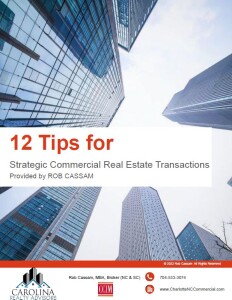This month’s newsletter has just been released! Check out the latest tips for tenants and users of commercial real estate space.
In this issue
- Convert And Upgrade For A New Potential
- Why The Land Under A Business Is The Most Valuable Asset
- Important Considerations In Ground Leasing
- How To Restructure Troubled Property
- Commercial Real Estate Representation
One of the ways to increase income and value is to upgrade an older property. In every community, anyone who looks can usually find a number of commercial buildings, apartments or offices that need to be modernized. Some are for sale because the present owner may not recognize the increased return that they could get or do not want to make a further investment. The property might be purchased at a bargain price that is based on the current cash return. Don’t overlook properties that are still productive, but may have a much greater potential after a conversion. Factories have been converted to shopping centers all over the country. Old Movie theaters have been converted to multi-screen facilities. Garages have been converted to condominium parking buildings. Seeing potential profits in older buildings takes imagination….(more)
Anyone who owns a home that was located in a hot housing market a few years ago knows that the land can be worth more than the actual home. Now many companies are figuring out the same about their own real estate holdings. Many entrepreneurs spend their adult lives building a business up so that it can be sold at their retirement or passed down to their heirs. Now many of them are finding that the land under the business is worth far more than the business itself….(more)
Landowners may choose the ground lease as a way to benefit an easy and risk-free investment vehicle and as a way to secure the long-term appreciation of the property. Sometimes a ground lease can put the lessor at risk. That is because the deal centers on the concept of sharing economic returns. The lessor becomes a partner of the lessee because the total rent is usually determined by the lessee’s net operating income or net cash flow. If the lessee does well, the lessor does too. However, if the lessee’s business is a loser, so is the lessor.
Therefore, the lessor must consider the financial feasibility of the project. Independent analysis should show that the project represents the correct improvement of the site and that the projected payments will actually be received by the lessor….(more)
In any market, good or bad, there are always problem properties. Most are only troubled or problem properties because of the current ownership. Some may be neglected only because the present owner has failed to do fairly simple things that can solve the problems. Buying property and solving problems is a profit-making business.
Have you seen: An empty office building. A remodeled apartment house or hotel that has an excessively high level of vacancy. A large tract of undeveloped land that no developer has become serious about wanting to develop. These are examples of troubled property–property that is a definite financial burden to continue to hold but which also is unattractive property to some prospective buyers. Unattractive, that is, until very recently….(more)
There are a number of ways to buy, sell or exchange investment or commercial real estate. Having the knowledge of what you can do in some tax situations can be the difference between an annual profit or loss in a property that you intend to acquire or one that you already have in inventory. The professional commercial real estate broker is in the position to represent clients in real estate transactions by setting up sales, exchanges, leases, purchase and sales of options, and management of real estate. A professional real estate practitioner must stay aware of current tax laws and court decisions in order to structure transactions, but does not give legal or tax advice (unless he/she is also an attorney or a certified public accountant). In any complex transaction that might result in changes in any owner’s legal or tax situation, the other members of the “consulting team” should be the owner’s attorney and CPA. We always recommend meeting with these other professionals during the planning and closing of major real estate transactions…..(more)




